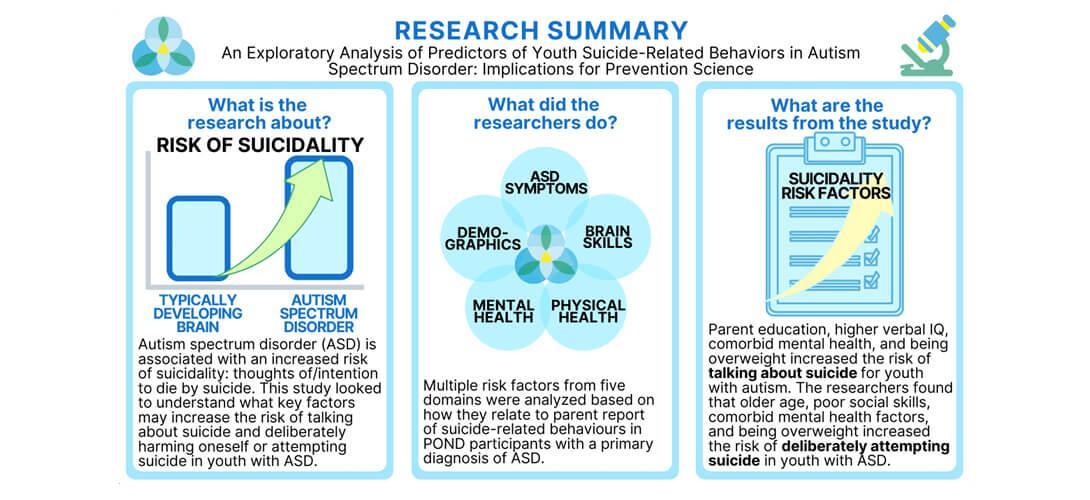New Research Identifies Risk Factors for Self-Harm in Youth with Autism

How is OBI bringing lab to life > New knowledge and understanding of brain disorders + Collaborative research and partnerships
“No one should have to lose a loved one to suicide. It is our responsibility as a community to do better, to help youth find help and not let them give up. And as a researcher, it starts with identifying risk factors earlier in development that can aid in better risk assessment and then laying out targeted prevention and intervention programs in childhood”, says Dr. Ryan Stevenson, Assistant Professor, Western University and an Investigator at POND (OBI’s neurodevelopmental disorders program). “There is a gap in our understanding, and we need to do our best to address this soon.”
The quest to improve quality of life for individuals with brain disorders begins with asking new questions about underlying causes and risk factors, and then exploring effective new treatments and intervention tools. As a result, the POND Network is exploring risk factors associated with self-harm and suicide behaviours in youth with autism spectrum disorder (ASD). By identifying these risk factors health care practitioners can intervene early to prevent or reduce rates of suicide.
The POND Network, one of the six research programs carried out in partnership with OBI, is a network of experts striving to understand the biological underpinnings of neurodevelopmental disorders. With that objective in mind, POND researchers turned their attention to how biology impacts mental health and wellbeing in youth with ASD.
Despite healthcare practitioners’ improved ability to address mental health concerns for individuals with ASD, there is still a limited understanding of suicidality, thoughts of or intention to die by suicide, in ASD. Prior research has shown that individuals diagnosed with ASD are at a heightened risk of suicidality due to many challenges associated with their experience, however, little is known about the social, biological and clinical factors leading to suicidality in those with ASD.
The overall wellbeing of an individual is often overlooked because the focus is on the symptoms, the condition, or just everyday management. While we should also acknowledge that it takes several triggers for a person to move from sad, to depressed, to thoughts of suicide – and if we become more mindful of these signs and focus on the overall wellbeing of a person, rather than just their immediate condition – we will get better at addressing the issue at hand.
To address this gap in understanding, POND Network researchers working in collaboration with Dr. Christina McDonnell, Assistant Prof, Virginia Tech, began looking into what key factors are associated with an increased risk of talking about suicide and deliberately harming oneself or attempting suicide. Using the POND Network’s existing patient database, researchers looked at risk factors for suicidality in 481 children with a primary diagnosis of ASD. These risk factors were then analyzed to see how they related to parental reports of suicide-related behaviours in the research participants.
It was found that lower parent education, higher verbal IQ, mental health, and being overweight increased the risk of talking about suicide for youth with autism. Researchers also found that older age, poor social skills, mental health factors and being overweight increased the risk of deliberately harming oneself or attempting suicide. Based on their findings the research identified a clear need for a holistic assessment of suicidality in youth with ASD – that includes not only clinicians but also their support systems, including family and caregivers.

This study allowed researchers to have a better idea of which risk factors of suicidality to look for as part of an early screening process. From there, the next step is to develop programs focused on prevention – not only will this reduce the risk of suicide in youth, but it can also potentially reduce the risk of suicide in adulthood.
“This study has given researchers and clinicians additional tools for working with youth with autism, and more importantly, it’s a prompt for us to make system-wide changes in our society to ensure that autistic individuals don’t end up in this situation in the first place”, says Dr. Stevenson. “The identification of these risk factors allows us to be mindful, to look out for these tell-tale signs and act swiftly to address risks with families, caregivers and with the youth themselves.”
“This study has given researchers and clinicians additional tools for working with youth with autism, and more importantly, it’s a prompt for us to make system-wide changes in our society to ensure that autistic individuals don’t end up in this situation in the first place. The identification of these risk factors allows us to be mindful, to look out for these tell-tale signs and act swiftly to address risks with families, caregivers and with the youth themselves.”
Dr. Stevenson, Assistant Professor, Western University and an Investigator at POND
OBI is proud to have funded and facilitated this research, which is the first study to examine core autism symptom domains and a diverse range of medical concerns. It is just one example of our commitment to identifying gaps in knowledge and care and then bringing together researchers, clinicians, industry partners, patients and advocates to accelerate understanding and drive innovation in the treatment of brain disorders.
Learn more about the POND Network, the latest research and resources for the public here.
